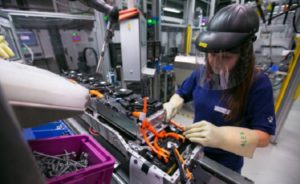
Four types of advanced batteries could reportedly be nearing readiness for electrified vehicle and energy storage markets.
Four types of advanced batteries could reportedly be nearing readiness for electrified vehicle and energy storage markets.
While lithium-ion (Li-ion), advanced lead-acid, flow, and molten sea batteries have become the most commercially available advanced batteries, there are better battery technologies waiting in the wings, according to a study by Navigant Research. Lithium sulfur (Li-S), lithium solid-state (Li-SS), next-generation flow, and a liquid metal battery are at the level of laboratory-scale research or pilot-scale production levels today.
Li-ion is currently the primary chemistry used for transportation and grid-tied stationary energy storage applications that require next-generation batteries. There will be limitations to Li-ion over time, including challenges related to energy density, safety, and costs, Navigant Research says.
Li-S, Li-SS, next-generation flow, and other advanced batteries could be contenders encroaching on Li-ion’s market share as the world’s most flexible battery chemistry in the transportation and stationary energy storage sectors. The […]










